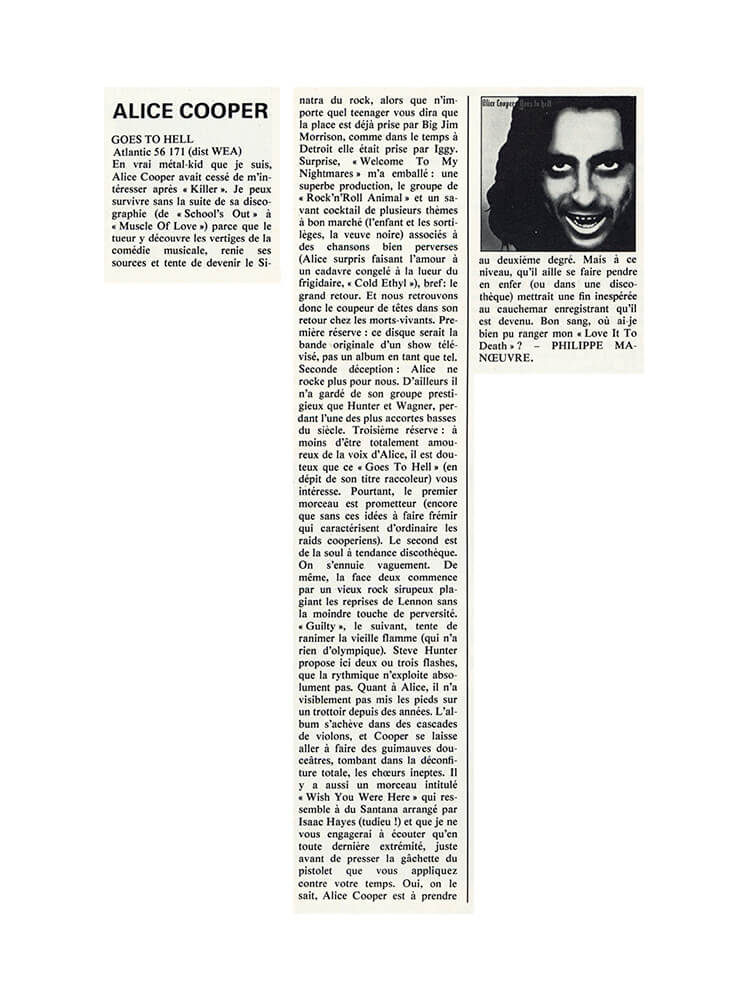GOES TO HELL
Atlantic 56 171 (dist WEA)
En vrai métal-kid que je suis, Alice Cooper avait cessé de m'intéresser après "Killer". Je peux survivre sans la suite de sa discographie (de "School's Out" à "Muscle Of Love") parce que Ie tueur y découvre les vertiges de la comédie musicale, renie ses sources et tente de devenir Ie Sinatra du rock, alors que n'importe quel teenager vous dira que la place est déjà prise par Big Jim Morrison, comme dans le temps à Detroit elle était prise par Iggy. Surprise, "Welcome To My Nightmare" m'a emballé: une superbe production, le groupe de "Rock'n'Roll Animal" et un savant cocktail de plusieurs thèmes à bon marché (l'enfant et les sortilèges, la veuve noire) associés à des chansons bien perverses (Alice surpris faisant l'amour à un cadavre congelé à la lueur du frigidaire,”Cold Ethyl”), bref: le grand retour. Et nous retrouvons donc le coupeur de têtes dans son retour chez les morts-vivants. Première réserve: ce disque serait la bande originale d'un show télévisé, pas un album en tant que tel. Seconde déception: Alice ne rocke plus pour nous. D'ailleurs il n'a gardé de son groupe prestigieux que Hunter et Wagner, perdant l'une des plus accortes basses du siècle. Troisième rèserve: à moins d'être totalement amoureux de la voix d'Alice, il est douteux que ce "Goes To Hell" (en dêpit de son titre racoleur) vous intéresse. Pourtant, le premier morceau est prometteur ( encore que sans ces idées è faire frémir qui caractérisent d'ordinaire les raids cooperiens). Le second est de la soul à tendance discothèque. On s'ennuie vaguement. De même, la face deux commence par un vieux rock sirupeux plagiant les reprises de Lennon sans la moindre touche de perversité. "Guilty", le suivant, tente de ranimer la vieille flamme (qui n'a rien d'olympique). Steve Hunter propose ici deux ou trois flashes, que la rythmique n'exploite absolument pas. Quant à Alice, il n'a visiblement pas mis les pieds sur un trottoir depuis des années. L'album s'achève dans des cascades de violons, et Cooper se laisse aller à faire des guimauves douceâtres, tombant dans la déconfiture totale, les chœurs ineptes. Il y a aussi un morceau intitulé "Wish You Were Here" qui ressemble à du Santana arrangé par Isaac Hayes (tudieu!) et que je ne vous engagerai à écouter qu'en toute dernière extrémité, juste avant de presser la gââchette du pistolet que vous appliquez contre votre temps. Oui, on le sait, Alice Cooper est à prendre au deuxième degré. Mais à ce niveau, qu'il aille se faire pendre en enfer (ou dans une discothèque) mettrait une fin inespérée au cauchemar enregistrant qu'il est devenu. Bon sang, où ai-je bien pu ranger mon "Love It To Death"?



